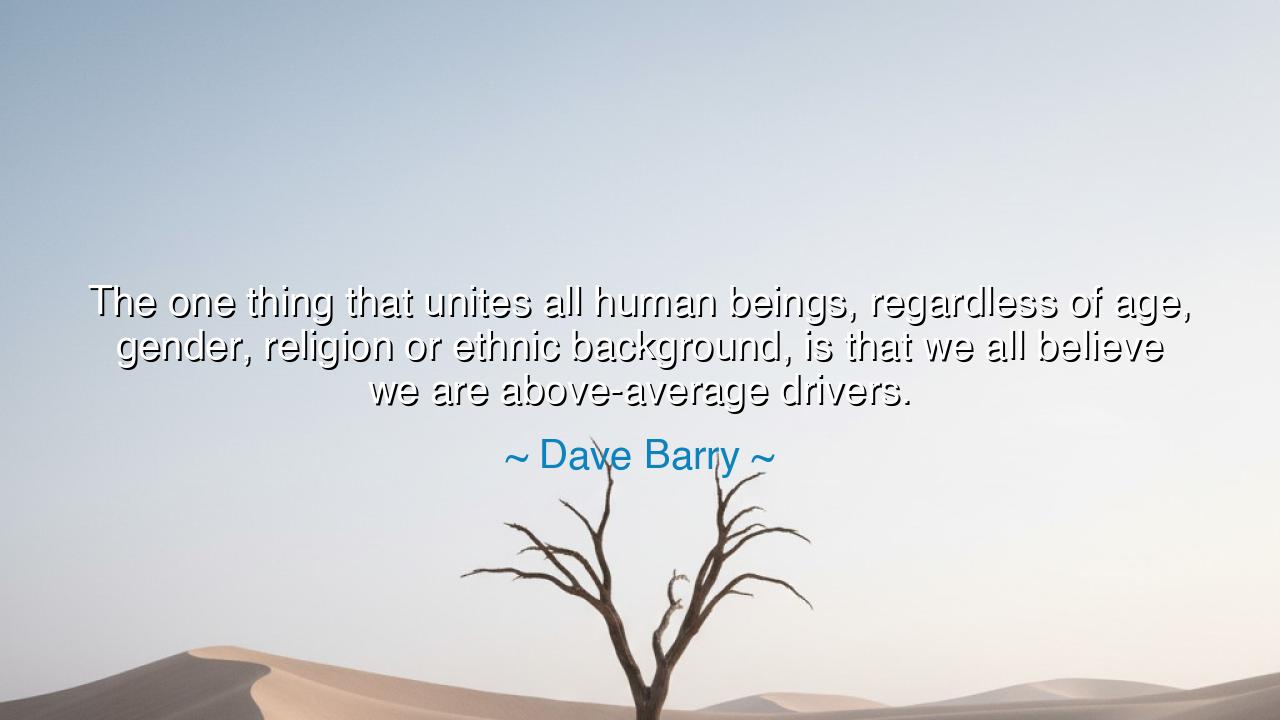
The one thing that unites all human beings, regardless of age
The one thing that unites all human beings, regardless of age, gender, religion or ethnic background, is that we all believe we are above-average drivers.






In the ancient wisdom that has been passed down through the ages, there is one truth that has remained constant: the human spirit is both proud and deluded. Dave Barry, with his wit and insight, captures this eternal paradox with great clarity when he declares, "The one thing that unites all human beings, regardless of age, gender, religion or ethnic background, is that we all believe we are above-average drivers." It is a statement that transcends the mundane and touches upon the very nature of human pride, and of how we perceive ourselves in relation to the world around us.
In every age, from the time of the ancient warriors to the scholars of old, there has been a certain arrogance in the human spirit. The warrior believes himself invincible, the wise man certain of his knowledge, and the merchant confident in his trade. So too, the modern driver, whether young or old, man or woman, rich or poor, believes that the wheel is his domain. He moves through the world as though he is not just a participant, but the very master of the road, confident that his skill exceeds that of all others around him. Barry’s words remind us of this universal delusion of superiority that unites us all—no matter who we are, we each believe we are above the rest in some way.
This idea of self-delusion is as old as humanity itself. Consider the tale of the Greek hero Narcissus, who, gazing into the still waters of a pond, fell in love with his own reflection. Narcissus, though admired by all for his beauty, could not see the truth of his own flaws. He believed himself to be above all others, and his self-obsession led to his tragic downfall. Narcissus, like the modern driver, could not step beyond the illusion of his own greatness. The danger of believing oneself to be superior is not just in the pride it engenders, but in the blindness it brings to the reality around us.
In our own time, drivers—whether in cars, on horseback, or by any other means—believe themselves to be the masters of their craft, even as they rush through the world with little awareness of their own limitations. Think of the many accidents and mishaps that occur daily on the roads, each one a testament to the human tendency to overestimate one’s abilities. Barry’s humorous insight is not merely a playful observation; it is a reflection on human nature itself. For as proud as we may be of our skills, there is always a gap between what we believe ourselves capable of and the truth of our actions.
History is filled with those who were humbled by the reality of their own limitations. Alexander the Great, though a mighty conqueror, met his untimely death not through a great battle, but because of the excesses that came with the illusion of invincibility. He had conquered the known world and believed himself beyond reproach, but the truth—that his strength could be undone by human frailty—was something he could not perceive. And so, in his pride, he suffered a fate no greater than that of any other mortal.
The lesson we must take from Barry’s words is one of humility and awareness. To believe oneself above-average in any skill, whether it be driving, leading, or even loving, is to overlook the fact that we are all human, bound by the same flaws and limitations. Pride, when unchecked, blinds us to the realities around us and puts us at risk of failure. It is important, then, to recognize the fine line between confidence and arrogance. While it is good to strive for excellence, we must also recognize that there are always others with equal, if not superior, abilities.
Practical action calls upon us to temper our pride with awareness. Recognize that the world does not revolve around our own perception of greatness. Whether we are behind the wheel of a car or in the midst of a complex task, let us remember that we are part of a greater whole. Let us approach our actions with humility, accepting that we are not infallible, and being ever-conscious of the limits of our abilities. Only then will we avoid the traps of overconfidence and the delusions of superiority that plague us.
And so, remember this: the delusion of superiority that unites us all—whether we’re driving, thinking, or living—is not to be feared, but understood. Let it serve as a reminder to remain humble, to always question our assumptions, and to always strive to improve, knowing that the road we travel is long and filled with the lessons of our human nature. Let us be cautious of the illusion of being “above-average,” for only by acknowledging our flaws can we rise to our highest potential.






AAdministratorAdministrator
Welcome, honored guests. Please leave a comment, we will respond soon